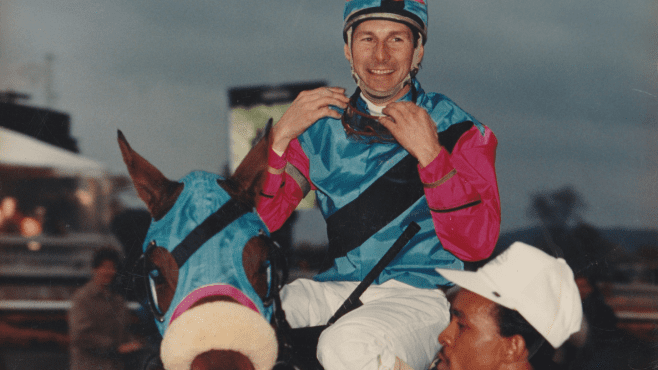
By RAYMOND PARTSCH III
Written for the LSWA
Ray Sibille never wanted to do anything else.
His earliest childhood memories were of him and his brothers taking turns racing their daddy’s match race horses down the narrow dirt road to their family home in Sunset, and watching the thoroughbreds gallop around the original Evangeline Downs race track in Carencro.
“We couldn’t get in,” Sibille said. “So, my daddy parked the car by the fence. And we all just stood on top of the car to watch the races. That was the highlight of my week.”
All those nights spent at Evangeline Downs only reinforced what Sibille wanted to do with his life.
“I’ve never had a second in my life that I didn’t want to be a jockey,” Sibille said. “It’s the only thing I wanted to do.”
Sibille rode 4,264 winners in a 35-year racing career highlighted by winning the $2 million 1988 Breeders’ Cup Turf race at Churchill Downs.
Sibille will add another distinction when he will be inducted into the Louisiana Sports Hall of Fame as one of the members of the Class of 2024 in Natchitoches. He is among 12 state sports heroes to be honored June 20-22 in Natchitoches. For participation opportunities, visit LaSportsHall.com or call 318-238-4255.
“He could ride anything,” friend and fellow LSHOF jockey Eddie Delahoussaye said. “He was an outstanding judge of pace and work ethic. That plays a big part in your career. Ray had it all.”
Sibille becomes the latest jockey born and raised in Acadiana to be inducted into the Louisiana Sports Hall of Fame. The Sunset native joins Catahoula’s Calvin Borel (2017), Carencro’s Ronald Ardoin (2013), Lafayette’s Mark Guidry (2012), Erath’s Randy Romero (2005) and New Iberia’s Delahoussaye (2002).
Like all those other Baby Boomers from Acadiana, Sibille earned his stripes racing local bush tracks.
“It taught you about the balance and feeling of a racehorse,” Sibille said. “It taught you how to ride, how to whip and stay in motion with the horse. When you first start, you’re working against the horse because you are trying to figure out how to do it.”
He added: “For those guys that were raised in the city, they didn’t start riding until they were 16, and they had never rode before. Well, all of us Cajun riders were way ahead of them because of that experience.”
Sibille also gained valuable experience working at the track.
He got his first job at 16 working for trainer Buster Leger and he would spend his mornings working out the horses at Evangeline Downs before going to class all day at Sunset High School.
That also allowed Sibille to travel to other tracks such as the famed Fair Grounds in New Orleans. It was there where he got to see one of his heroes — famed jockey Robert Lee Baird, who twice won the Sugar Bowl Stakes and the Louisiana Derby.
“You got to watch the jockeys a little bit,” Sibille said. “The best one was Bobby Baird. When I started, he was already in his 50s. He served under General (George S.) Patton during World War II. He used to tell us that he had been in the war, been in the nuthouse and he would tell us, ‘I see a lot of you come around here.'”
It wouldn’t be long until Sibille won his first professional race.
That took place on a clear night at Evangeline Downs in 1969 as the young jockey rode Joe Sada to a half-length victory in a 6½-furlong race.
“There was another apprentice like me and he won the race before mine,” Sibille said. “I remember thinking to myself, ‘I’m never going to win a race,’ and then I won the next race.”
He recalled, “I thought to myself, ‘I finally got one and I am not going to leave here with nothing.’”
Sibille quickly established himself as one of Louisiana’s best jockeys but he saw his career skyrocket in 1973 thanks to his agent “Jimmy” Paul Daigrepont presenting an opportunity to race for the majority of the year at the Chicago area tracks — Sportsman’s Park, Hawthorne and Arlington Park.
Arlington Park was the scene of 931 wins for Sibille, including his first major victory — a $100,000 stakes race atop Pocket Zipper for trainer Richard Hazelton. Even though he would still spend his winters racing in Louisiana, Sibille credits his time in Chicago to developing him.
“When I went to Chicago, I rode a lot of better horses,” said Sibille, whose brother-in-law is five-time Preakness Stakes winner Pat Day. “I rode good horses here, too, but not like what they had there. You just have the confidence, knowing that you had such a good horse that if you don’t fall off, you are going to win.”
Sibille would make another career move in 1981 when a six-week trip to California turned into 13 years, as he became a fixture racing at Santa Anita, Del Mar, and Hollywood Park. The move also reunited him with his old friend Delahoussaye and he raced against some of the best jockeys of the 1980s, including Kentucky Derby winners Bill Shoemaker and Chris McCarron.
“The year Ray came over to California we had the best colony of riders in the United States,” Delahoussaye said. “To compete against those guys day in and day out, even if you were the fifth or 10th on the list, you were doing well in that environment.”
During his time in California, Sibille would win major races such as the 1981 Yellow Ribbon Stakes and the 1988 San Juan Capistrano Handicap. The humble Cajun with a slight stutter also found himself rubbing elbows with celebrities such as Tim Conway and Jack Klugman at Beverly Hills parties and he even met President Ronald Reagan.
“It was surreal because they were asking me questions,” Sibille recalled. “They wanted to know about what I did.”
It was during his time riding in California that Sibille experienced the greatest achievement of his career.
While Sibille may have only ridden once in a Triple Crown race during his career — the 1984 Kentucky Derby when he rode Bedouin — the most famous venue in horse racing would be the site of Sibille’s greatest accomplishment.
In 1988, Sibille began riding Great Communicator for former Louisiana Public Service Commissioner George Ackel and Ackel’s son, Thad, who was the trainer. The victories piled up quickly as Sibille rode Great Communicator to wins at the Hollywood Turf Cup Stakes, San Juan Capistrano Handicap, San Marcos Handicap and San Luis Obispo Handicap.
That all led to the Breeder’s Cup that November at Churchill Downs, but getting to Louisville proved to be a challenge. Sibille and his wife Dot left Los Angeles the night before due to severe fog, then had a layover, missed their connection and the airline lost Dot’s luggage.
When they finally got there, Ackel was so nervous that he needed to map out the entire race as soon as Sibille arrived.
“He asked to meet me in the bar to talk about the race,” Sibille laughed. “We must have stayed there for three hours. I was drinking vodka and orange juice. He had this napkin and he kept drawing the whole thing out. I mean, we went through everything that might happen. The best thing he told me was to stay off the rail because it had rained overnight that whole week, and the turf was soft.”
Sibille rode Great Communicator in a controlled moderate pace and held off Sunshine Forever for a half-length victory.
“You are playing in the major leagues at that point,” Delahoussaye said. “It is a pinnacle race. To achieve a goal on that special day is the icing on the cake for a rider. Ray rode that horse perfectly.”
Delahoussaye added, “I worked that horse before Ray rode him, and I couldn’t get along with him. A lot of people think you can just ride a horse, but that’s not the way it goes. It is a lot of interaction sometimes you don’t have. Thad went to another Louisiana boy, that was Ray, and the rest is history.”
How did Sibille cap the milestone victory? By going back and watching the end of the LSU-Alabama football game.
“I got done in time to come back and watch the LSU kicker (David Browndyke) kick the game-winning field goal,” Sibille said.
Sibille would return to Chicago in 1993 and would race there until 2004 when hip replacement surgery ended his career at the age of 52. In the years since then, Sibille tried his hand at being a trainer but “that’s too much work.” He has become an advocate for The Permanently Disabled Jockeys Fund and he still helps out at Evangeline Downs.
“He is a class act guy,” Delahoussaye said. “His work ethic is what made him achieve his goals. He still loves his sport. He still works at the track clocking horses. He loves being involved. You could talk to anyone about Ray and they won’t have anything bad to say about him.”
That’s not a surprising statement about a man who was bestowed with the George Woolf Memorial Jockey Award, which honors riders whose careers and personal character earn esteem for the individual and the sport of thoroughbred racing.
Now Sibille will add one more accolade — Louisiana Sports Hall of Famer. He is excited and humbled by the honor.
“I told Eddie I thought I’d go in with him,” Sibille said. “But going in with Drew Brees … you know, he won a Super Bowl! Oh, yeah I am excited.”
Raymond Partsch III is president of the Louisiana Sports Writers Association, an award-winning writer and editor, and hosts a daily sports radio talk show that airs in Lafayette and Lake Charles.

